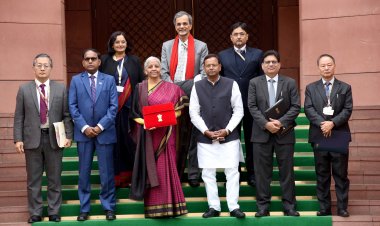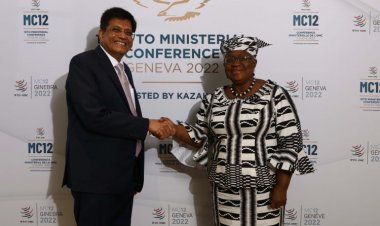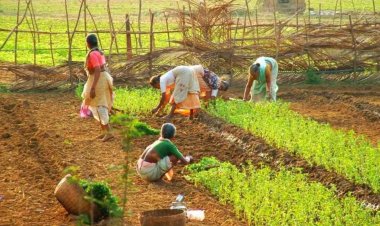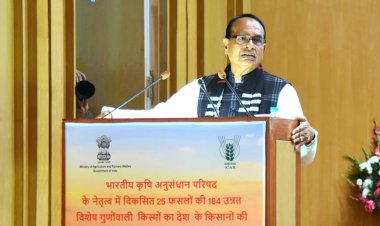Where are Panchayats in Election Manifestos?
In this article not only what the political parties said about Panchayati Raj in their manifestos mentioned but also throw light on what have these political parties done in the past in rural local governance. It becomes more important on two reasons as compared to other issues with which India is grappling.
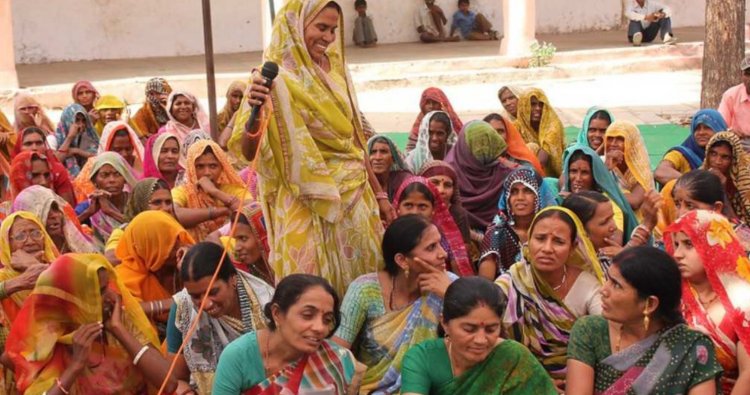
Elections for the 18th Lok Sabha are being held. As usual political parties have been releasing their manifestos listing out their intentions for implementation if they are voted to power. The various issues listed in the manifestos like corruption, stability, social justice, secularism, etc. were presented to the voters by various modes of media in the country. But what did these political parties have to say on empowering the Panchayati raj system, which is the only mode to enable the villagers to participate in nation-building from below by introducing accountability and transparency in governance are not mentioned?
Therefore, in this article not only what the political parties said about Panchayati Raj in their manifestos mentioned but also throw light on what have these political parties done in the past in rural local governance. It becomes more important for two reasons as compared to other issues with which India is grappling.
First, more than 68 percent population lives in rural areas of the country. So any happening in that area affects the entire country. Second, as a result of the 73rd constitutional amendment, about 34 lakh elected representatives of panchayats at village, block and district levels have been in position as members and chairpersons. This represents the broadest base at the grassroots in the world and cannot be ignored without hurting the nation's interests. Here, we attempt to compare the various election manifestos and evaluate critically to what extent these parties have envisaged deepening decentralized democracy in their intentions reflected in manifestoes.
The Indian National Congress in its manifesto named Nyay Patra promised the following:
“A portion of GST revenues will be allowed to Panchayats”
“We will also work with state governments to evolve a formula to devolve funds including a share of GST revenues, directly to panchayat and municipalities”
“We will implement renewable energy schemes that will make the Panchayats or municipality self-sufficient in electricity as far as possible.”
“Congress, as the author of the 73rd and 74th Constitution Amendments, will prevail upon the states to implement those provisions in letter and spirit and devolve funds, functions and functionaries upon the panchayats and municipality. Congress will enhance the role and authority of Gram Sabhas in matters concerning village panchayats. We will enhance the authority of the Gram Sabha in the administration of the following Acts:
(a) The Panchayats (Extension to Scheduled Areas Act, 1996
(b) The Forest Rights Act, 2006
(c) The Land Acquisition Act, 2013”
Congress will enhance financial assistance to the Autonomous District Councils in the North Eastern states.”
“Congress will revive the Autonomous District Council(ADCs) in the North Eastern states and make them an effective instrument of local government. We will ensure that more funds are channelled through the ADCs for developmental works.”
In the exploration and extraction of natural resources, the manifesto says, “Representatives from the concerned panchayat or municipality will be consulted before undertaking such projects.”
“Congress will pay special attention to access to water and democratic sharing of water. We will address these issues by focusing on storage in dams and water bodies, replenishing groundwater and creating a large participatory programme of water management involving the state governments, civil society organisations, farmers, panchayats and gram sabhas, and municipalities.”
Bharatiya Janta Party in its manifesto named Modi ki Guarantee promised the following:
“We will take further steps to facilitate fiscal autonomy and sustainability of Panchayati Raj Institutions”.
While talking about sustainable development of hill States, the manifesto says that “we will work with state governments and local bodies to prepare a special master plan to maintain their pristine beauty and biodiversity, taking into account the local geography, culture and traditional practices, for the balanced development of hilly areas.”
The Communist Party of India (Marxist) in its Manifesto promised the following:
“Setting a target for minimum level of Local Self-Government expenditure to GDP; funds devolved to the local bodies to be routed through the state governments”.
The Samajwadi Party brought out “Janta ka Mang Patra; Hamara Adhikar” as its manifesto.
In the document, Dr. Ram Manohar Lohia has been quoted at various places but not a single word has been mentioned for rural local governments, for which Dr. Lohia was staunch supporter. At least his ideological underpinning in the guise of a “Four Pillar State” (i.e. village, district, State and Centre) may be mentioned as intention of the party for decentralised policy.
The party’s manifesto mentioned the development of Backwards, Dalits, Adivasi, Minorities and Women. This could have been achieved easily at the local level by strengthening panchayati raj institutions. But no concern has been shown for them in the context of rural local governments.
Similarly, Rashtriya Janata Dal (RJD) in its manifesto has not mentioned anything about empowering panchayats.
Dravida Munnetra Kazhagam (DMK) has not promised anything for strengthening Panchayats.
All India Trinamool Congress (TMC) has not made any promises about strengthening Panchayats except to say that camps would be organised at Gram Panchayat or ward level periodically for delivery of services.
While it was expected that being the believers of socialism and followers of Dr. Lohia, they might have proposed for strong local government.
But at the same time, it may be said that since SP, RJD, DMK and TMC are part of the INDIA Bloc, they bank upon the manifesto of the Congress which is the only party ahead of all in taking actions for deepening decentralised democracy in the form of Panchayats.
Comments:
Based on the above provisions about Panchayats contained in the manifestos of different political parties show ‘business as usual” except Congress because its intentions not only promise to share GST with Panchayats but also strengthen them in the North Eastern states and tribal areas of the country.
The engagement of Gram Sabhas in solving local problems locally is another step to deepening grassroots democracy in the countryside. It would have been better if the Congress might have promised rural local lists of subjects in the Constitution from gram Panchayat to Zila Panchayats for defacto decentralisation.
Congress might have promised to implement programmes like BRGF under which the constitution of the District Planning Committee was mandatory. Thirdly, a decentralised judiciary at the local level might have also been part of the promise of the party.
BJP promised to facilitate fiscal autonomy and sustainability of the PRIs. It is a good intention. But the question arises how. Two examples may be cited here in this regard. First case, take the example of the Har Gar Jal Scheme or Jal Jeevan Mission.
The operational Guidelines of the Programme (2019) merely said about the engagement of Gram Panchayats only and not the intermediate (Panchayat Samiti/Block Samiti/Janpad Panchayat/ Khestra Panchayat) and Apex level( Zila Panchayat) in its implementation. Surprisingly, Implementing Support Agency (ISA) like NGOs are there but no involvement of Panchayats at block and district levels.
At the district level, a separate District Water and Sanitation Mission have been constituted but no faith has been shown in the Zila Panchayat Institution, which is a constitutional body. Under such an arrangement, it seems incompatibility has been in built in the implementation of the programme. Secondly, conditionalities imposed by the Fourteen Finance Commission and by the Union Government have negatively impacted the drawing of performance grants by the Panchayats.
To conclude, I think what the Asian Development Bank said about governance as “… means the way those with power use that power” does not appears to appear relevant in the present context. Conversely, governance appears relevant application of rules and regulations prepared with the engagement of the people of the country.
(The author is an expert on matters of local governance and development)



 Join the RuralVoice whatsapp group
Join the RuralVoice whatsapp group


















